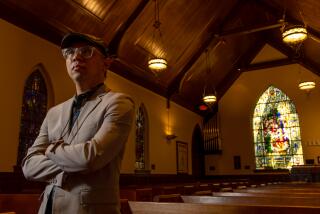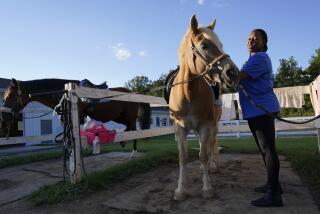Witness: Danny Chen was forced to crawl on day he shot himself
- Share via
FT. BRAGG, N.C. -- Hours before he committed suicide in Afghanistan on Oct. 3, Pvt. Danny Chen was forced to crawl on his belly across rocky terrain while fellow soldiers pelted him with stones, a soldier from Chen’s platoon testified at a court-martial Friday.
Eight soldiers are charged in the death of Chen, 19, a Chinese American infantryman who prosecutors say killed himself after he was hazed, abused and subjected to ethnic slurs for weeks at a remote combat outpost in southern Afghanistan.
No one intervened to help Chen, Spec. Nicholas Sepeda testified. He said Chen was unfairly singled out for punishment and ethnic harassment by his superiors, including Sgt. Adam Holcomb, the first defendant to face a court-martial.
Holcomb was not among the non-commissioned officers who forced Chen to crawl the day he died. But other soldiers have testified that Holcomb earlier dragged Chen across sharp, baseball-sized rocks, bloodying his back, and called him “dragon lady,” “egg roll” and other slurs.
Sepeda, a defense witnesses, told Holcomb’s lawyers he never saw him mistreat Chen or use racial epithets. But asked on cross-examination whether Holcomb was “a racist” and whether Chen was “treated like dirt,” Sepeda, replied, respectively, “Yes, sir,” and, “Yes, he was.”
Sepeda was among a dozen defense witnesses Friday on the fourth day of Holcomb’s court-martial. He is charged with negligent homicide, reckless endangerment, assault and other counts that could result in nearly 18 years in prison with conviction on all charges.
Defense lawyers introduced testimony Friday challenging a key prosecution witness. Pfc. Degan Berhe had testified Thursday that he told a superior Chen had confided to him that he was contemplating suicide because Holcomb had constantly abused him. It was the only testimony to directly link Chen’s suicide to Holcomb’s actions.
But Berhe’s sergeant, Staff Sgt. Calvin Stammer, testified Friday that he was “100% confident” that Berhe never told him any such thing. Nor, Stammer said, had Berhe told him that he failed to report Chen’s suicide threat to Chen’s sergeants because they were “racist” – as Berhe had testified.
On cross-examination, a military prosecutor implied that Stammer had cause to deny Berhe’s account: If true, it would mean Stammer had failed to report a soldier’s suicide threat up the chain of command.
Stammer, testifying by phone from a base in Alaska, replied that if he had been told Chen had threatened suicide, he would have immediately reported it so that Chen could get help.
Two other soldiers, echoing previous testimony, also testified Friday that Chen’s parents had disowned him because he had joined the Army. And Chen’s team leader testified that the slender, shy private was physically weak, incompetent and didn’t know how to properly fire his automatic rifle.
The defense has argued that Chen killed himself because his parents rejected him and because he had utterly failed as a soldier. Defense lawyers have also said that most punishment Holcomb meted out was warranted by Chen’s failure to perform, and that most ethnic slurs were nicknames or “terms of endearment.”
Spec. Zachary Bolin, a medic, testified Friday that the term “dragon lady” was not “used with anger behind it or disrespect behind it.” Bolin also said that other disparaging, anti-Chinese slurs allegedly uttered by Holcomb were “nicknames” or “a general term for Asian people.”
Sgt. William Zade, Chen’s team leader, described Chen as “deficient” in every possible infantryman’s skill. He was chronically late for guard duty, fell asleep on watch and didn’t know how to use his night vision goggles. Chen was so inept, Zade said, that the platoon couldn’t risk taking him on dangerous foot patrols outside the outpost.
Nor could the platoon simply get rid of Chen, Zade said, because the unit was critically short-handed and would not get a replacement. Chen could at least perform guard duty or other chores to free up soldiers for foot patrols.
Zade said Chen was subjected to approved punishments known as “corrective training” to try to improve his strength and performance. In certain instances, Zade testified, dragging a soldier across sharp rocks was appropriate for serious offenses.
Zade said he never saw Holcomb abuse Chen, and no one in the platoon was out to get the private.
Pfc. Anthony Manley also said he never saw Holcomb abuse Chen. Holcomb was a caring leader who “treated me like I was a human being,” Manley testified.
The court-martial judge, Maj. G. Bret Batdorff, denied a defense motion to dismiss the negligent homicide and reckless endangerment charges against Holcomb, who has pleaded not guilty. The court-martial resumes Saturday.
One witness Friday shed some light on the disputed “disowned” issue. Chen’s parents testified earlier this week that they had never disowned their son. Spec. Justin Christensen said Chen told him that he and his parents had “made up” after Chen received a care package from them.
“He was extremely happy,” Christensen said. “He had a big ol’ smile on his face.”
Several soldiers testified Friday they saw no signs that Chen was suicidal. But Pfc. Timothy Carner said Chen told him he had slept in a portable toilet because he believed he had “dishonored himself” in the platoon and was not worthy of a bunk indoors.
Christopher Hubbard, a special agent with the U.S. Army Criminal Investigation Command who headed the investigation into Chen’s death, said he agreed with a prosecutor’s description of “rampant abuse” of Chen at the tiny base, Combat Outpost Palace, in rural Kandahar province.
That abuse culminated the day of Chen’s suicide, when two sergeants forced Chen to “low crawl” – a technique normally used to stay low and avoid enemy fire – about 50 meters to a base guard tower, Sepeda testified. He said Chen was being “smoked” -- punished -- for failing to wear his helmet when reporting for guard duty.
Several soldiers started pelting Chen with rocks, shouting “incoming’’ – the warning for artillery fire, Sepeda said. No one intervened, and the punishment continued until Chen had crawled to the guard tower, he said.
“I tried not to pay attention to it,” Sepeda said. “If you’re not getting smoked, you just stay out of it.”
But he added, “I didn’t think it was right for them to be doing that.”
In fact, Sepeda said, he took photos of Chen’s injured back after a different incident, when Holcomb dragged the private across rocks. Sepeda said he gave the photos to a sergeant he trusted because he didn’t think other non-commissioned officers at the base would do anything about it. Testimony did not indicate whether the sergeant passed the photos on to superiors.
Sepeda was an inconsistent witness. He told a defense lawyer that Chen had not been singled out for abuse. But when asked by a prosecutor whether everyone on the base knew Chen was being unfairly treated and that no one was willing to stop the abuse, Sepeda replied, “Yeah.”
Sepeda also agreed on cross-examination that Chen would often “get smoked for no reason at all.”
After he was “smoked” on Oct. 3, Chen finally was able to report for guard duty. A few hours later, alone in the guard tower, the troubled private shot himself under the chin with his automatic rifle.
ALSO:
Bullied school bus monitor calls it quits: She’s retiring
Maryland ‘Joker’ worked at facility linked to mail for U.S. House
Testimony: Private Danny Chen said slurs made him uncomfortable
More to Read
Sign up for Essential California
The most important California stories and recommendations in your inbox every morning.
You may occasionally receive promotional content from the Los Angeles Times.











